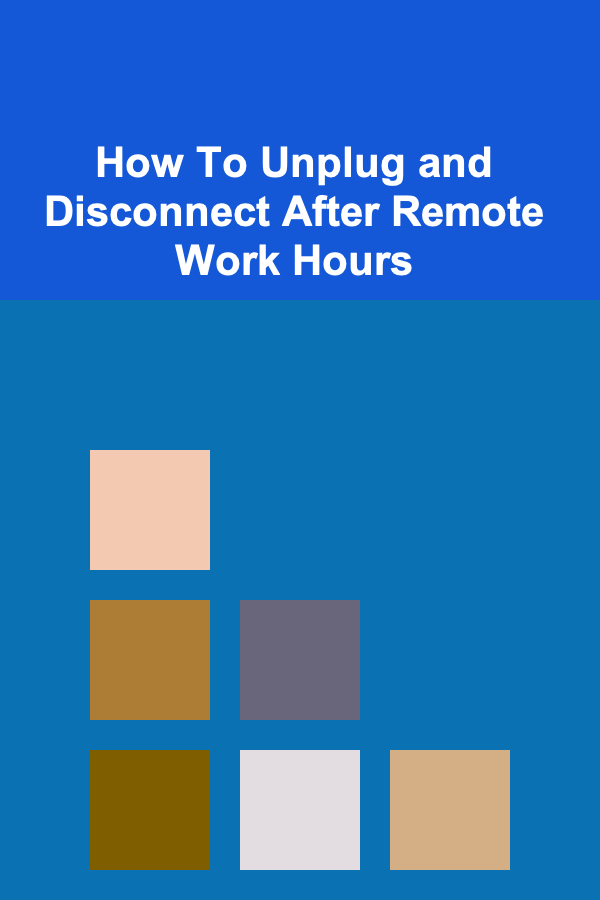
How To Unplug and Disconnect After Remote Work Hours
ebook include PDF & Audio bundle (Micro Guide)
$12.99$10.99
Limited Time Offer! Order within the next:

The evolution of remote work has significantly altered how we approach the work-life balance. With the rise of flexible hours, telecommuting, and virtual offices, remote work offers numerous advantages. However, it also presents unique challenges---one of the most pressing being the inability to "switch off" after work. When your home becomes your office and your office becomes your home, the lines between personal life and professional life can blur. This can lead to burnout, anxiety, and a general sense of overwhelm. The art of "unplugging" after work is essential to maintaining mental health, personal well-being, and productivity.
In this article, we will explore how you can successfully disconnect after remote work hours, ensuring that you preserve both your personal time and your mental peace.
The Importance of Disconnecting
Before diving into the "how," let's first explore why it's essential to unplug after working remotely.
1. Preventing Burnout
Burnout occurs when you are mentally, emotionally, and physically exhausted due to prolonged stress. It is particularly common among remote workers who struggle to set boundaries between work and life. Without physical separation, your mind stays constantly active, thinking about tasks, meetings, and deadlines, even after the workday ends.
2. Mental Health and Well-being
The constant connection to work can negatively affect your mental health. Feelings of guilt or anxiety can creep in when you know that you haven't answered an email or completed a task, even when you're "off." Over time, this erosion of personal time can lead to stress, anxiety, and even depression. Disconnecting is key to restoring your mental equilibrium.
3. Strengthening Personal Relationships
Remote work often means that we are spending more time in isolation, especially if you're working from home alone. By ensuring you disconnect from work at the end of the day, you make space for meaningful personal relationships. Engaging in hobbies, spending time with family and friends, or even simply being present in your own environment can significantly improve your quality of life.
4. Recharging Creativity and Productivity
It might seem counterintuitive, but the key to maintaining high productivity in the long run is to take breaks and rest. When you are constantly plugged into your work, you risk running out of creative energy and feeling mentally drained. Disconnecting helps refresh your mind, making you more productive when you return to your tasks.
Setting Boundaries for Remote Work
To unplug successfully, it's crucial to set clear boundaries between your work and personal life. This not only involves physical boundaries, such as a separate office space, but also mental boundaries. Here are some ways to set boundaries effectively:
1. Create a Dedicated Workspace
Ideally, your work environment should be a physical space distinct from where you relax or sleep. Creating a home office or setting up a designated workspace can help you mentally separate work from personal life. When you leave the space, it signals to your brain that the workday has ended.
If you don't have the luxury of a dedicated room, try designating a specific corner of your living area for work. Make sure that when you leave that space, you also leave your work mindset behind.
2. Set Specific Work Hours
One of the challenges of remote work is the flexibility it offers, which can lead to blurred lines between work hours and personal time. It's important to set specific start and end times for your workday, and communicate these boundaries clearly to your colleagues and clients. Sticking to these hours helps you develop a routine, ensuring that you have time to relax and recharge at the end of the day.
3. Turn Off Work Notifications
In the age of constant connectivity, work emails, messages, and project updates can arrive at any time. To create a clear boundary, it's important to mute or turn off work-related notifications after hours. By doing this, you prevent the constant stream of work-related information from intruding into your personal time. Consider setting up an "out of office" response during your non-working hours to manage expectations and prevent burnout.
4. Use Technology Mindfully
Technology can be both a blessing and a curse. While remote work tools allow for flexibility and collaboration, they can also lead to overwork if used excessively. Limit the use of work-related apps or platforms after hours. For example, avoid checking Slack, Asana, or other project management tools after work unless it's absolutely necessary.
There are apps that can help you track your time, block distracting websites, or even remind you to step away from your screen. These tools can help you manage your workday better and ensure you disconnect when it's time to do so.
Tips for Unplugging After Work
Disconnecting from work requires intention, but there are many strategies you can implement to make it easier. Here are some practical tips to help you unplug after remote work hours:
1. Engage in Physical Activity
Exercise is one of the most effective ways to decompress after a long workday. Physical activity not only improves your mood by releasing endorphins but also allows you to take your mind off work. You don't have to engage in intense workouts---simple activities such as yoga, stretching, walking, or cycling can be incredibly effective.
2. Practice Mindfulness and Meditation
Mindfulness practices, including meditation and deep breathing, can help you transition from work mode to personal time. These practices train your brain to focus on the present moment, letting go of the stress and worries of the workday. Taking 10--15 minutes to meditate or do deep breathing exercises can be a game-changer in how you manage stress and unwind after work.
3. Set a "Shutdown" Routine
Create a shutdown routine that marks the end of your workday. This can include actions such as closing your laptop, organizing your workspace, and writing down tasks for the next day. By having a clear routine, you signal to your brain that the workday is over. This can be a small but powerful habit to develop, as it gives you a sense of closure.
4. Pursue Hobbies and Interests
After a day of work, it's crucial to make time for activities that bring you joy and fulfillment. Hobbies like reading, cooking, painting, or playing a musical instrument can provide the perfect opportunity to focus on something other than work. These activities also allow you to connect with your creative side and recharge your mental batteries.
5. Spend Time with Family and Friends
Remote work often isolates you, which can make you miss the social interaction that comes with a traditional office setting. Make a conscious effort to spend quality time with family and friends after work. Whether it's through a dinner, a video call, or a simple walk together, social interactions are vital for emotional well-being.
6. Disconnect Digitally
While staying connected with colleagues and clients is important, it's equally vital to disconnect from digital devices at the end of the workday. Take time away from screens---this includes your phone, computer, and even television. The constant influx of notifications and information can cause mental fatigue, so it's beneficial to engage in activities that don't involve technology.
7. Embrace Offline Activities
Engage in offline activities such as journaling, cooking, gardening, or spending time in nature. These activities promote mindfulness and help you stay grounded in the present moment. Additionally, these activities offer a sense of accomplishment and relaxation, allowing you to unwind after a busy day.
Building Long-term Disconnecting Habits
Unplugging after remote work hours isn't a one-time fix---it's a habit that requires ongoing practice. Here are some strategies to ensure that you develop long-term habits that will protect your well-being and prevent burnout:
1. Prioritize Rest and Recovery
Rest is essential for productivity. It's important to make sleep and relaxation a priority in your routine. Aim for a consistent sleep schedule and focus on creating an environment conducive to sleep, such as dimming the lights, avoiding screens, and practicing relaxation techniques before bed.
2. Schedule Downtime
Just as you schedule meetings and tasks, schedule downtime in your calendar. This ensures that you're taking time for yourself and prevents work from creeping into your personal time. Whether it's a weekend trip, a hobby, or a quiet evening at home, make sure to intentionally block off personal time.
3. Reflect on Your Work-Life Balance
Regularly assess your work-life balance and make adjustments as necessary. If you find that work is creeping into your personal time too frequently, re-evaluate your boundaries, workload, and habits. Regular reflection ensures that you stay on track and maintain a healthy work-life balance.
4. Seek Support When Needed
If you find it difficult to disconnect or experience symptoms of burnout, it's important to seek support. Whether it's through therapy, talking to a mentor, or discussing your challenges with friends and family, seeking help can provide new perspectives and coping strategies.
Conclusion
The shift to remote work has fundamentally changed how we engage with our jobs and our personal lives. While it offers significant flexibility and convenience, it also demands a greater emphasis on setting boundaries and actively unplugging from work at the end of the day. By creating intentional habits, pursuing hobbies, practicing mindfulness, and establishing clear work-life boundaries, you can protect your mental health and maintain a healthy work-life balance. Unplugging is not a luxury---it's a necessity for sustaining long-term happiness, creativity, and productivity in the remote work environment.

How to Build a Party Supplies Checklist for Sports Viewing Parties
Read More
How to Renovate Your Home's Insulation for Better Energy Efficiency
Read More
How to Repurpose Old Furniture for Storage Solutions
Read More
How To Grasp the Principles of Crypto Arbitrage
Read More
Identifying Your Career Strengths and Passions: A Comprehensive Guide
Read More
10 Tips for Creating Elegant Table Number Holders
Read MoreOther Products

How to Build a Party Supplies Checklist for Sports Viewing Parties
Read More
How to Renovate Your Home's Insulation for Better Energy Efficiency
Read More
How to Repurpose Old Furniture for Storage Solutions
Read More
How To Grasp the Principles of Crypto Arbitrage
Read More
Identifying Your Career Strengths and Passions: A Comprehensive Guide
Read More